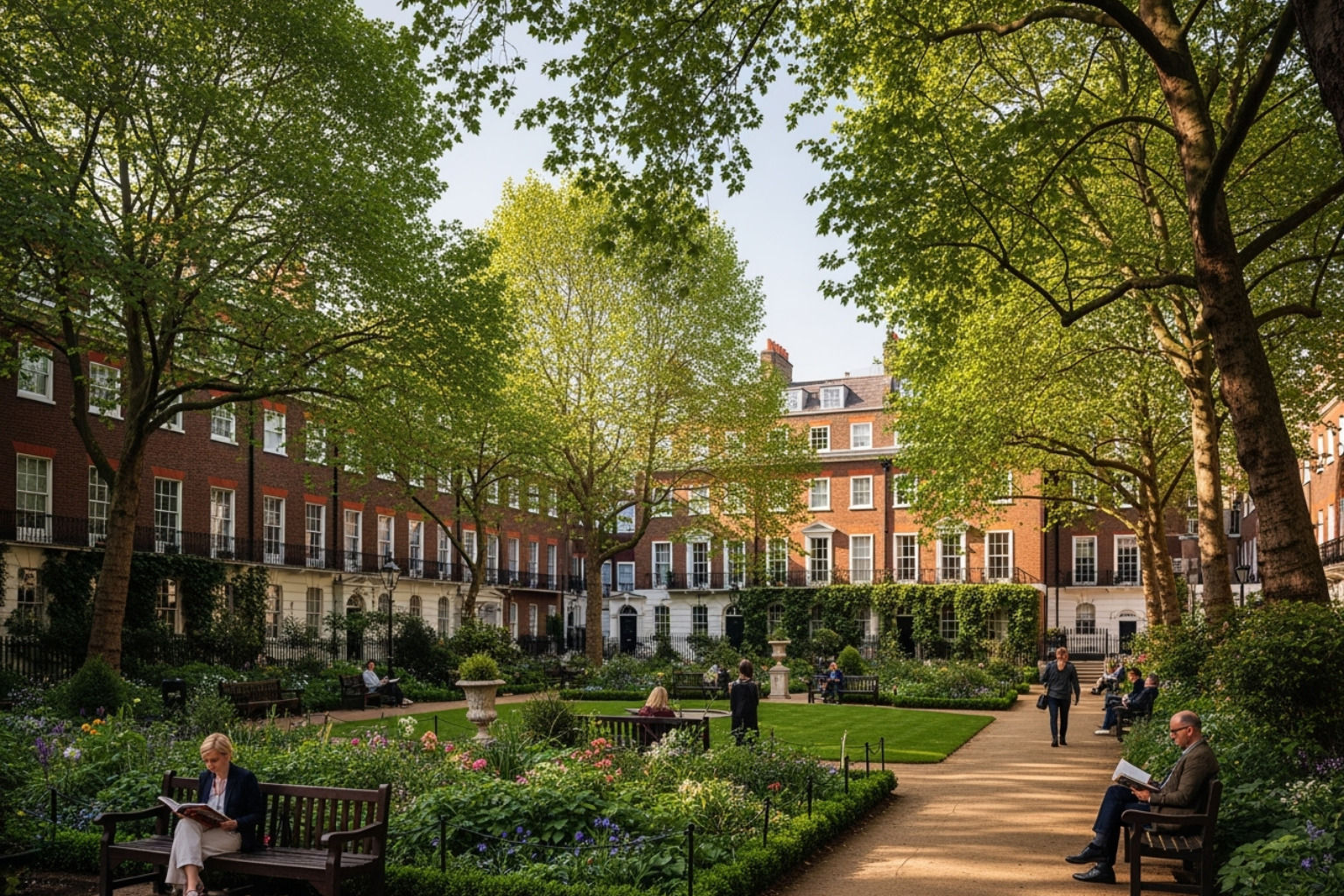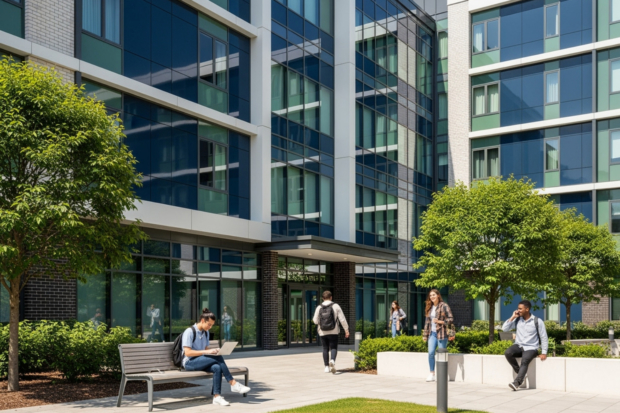Summary
Finding university housing in London can be a complex task for scholars who require flexible terms, furnished spaces, and quiet environments for work. This comprehensive guide provides in-depth advice on where to live, with detailed explorations of London’s zones and neighbourhoods. It explains how to compare different housing types, from private flats to house sitting, and how to use the SabbaticalHomes.com trusted matching service to find the perfect fit. With clear, actionable steps, detailed tips for international moves, and essential resources for security and tenancy, you can plan ahead and ensure a smooth and successful transition to your academic life in London.
How Can Scholars Find University Housing in London?
London is one of the world’s top academic destinations, but finding the right housing can be a challenge. As a postgraduate, researcher, or visiting scholar, your needs differ from the typical undergraduate. You may require flexible leases for research trips, a dedicated workspace, family-friendly options, or simply a quiet environment to focus.
University housing in London presents a puzzle of cost versus convenience across the city’s 9 transport zones. Rents are highest in Zone 1 (£350-£550 weekly) near major universities, decreasing in Zone 2 (£200-£325 weekly) and Zone 3 and beyond (£220-£295 weekly). Options range from Intercollegiate Halls and private rentals to co-living spaces and house sitting opportunities.
The real challenge is finding a home that supports your academic journey, as traditional rentals often lack the flexibility scholars need. This is where a community-focused approach makes a difference.
Since 2000, SabbaticalHomes has been a trusted resource for academics and scholars seeking affordable, short-term furnished housing options, leveraging expertise to address the unique challenges of finding reliable accommodation. Our platform connects you with hosts who understand the rhythm of academic life—from sabbatical years to research fellowships. It’s about finding a community that values privacy, respect, diversity, and trust, ensuring your home supports your academic goals.
Understanding Your Accommodation Options

When searching for university housing London, your options extend beyond standard student halls. As an academic, you might need a quiet space for writing, room for family, or a flexible lease.
- Furnished flats and houses are a top choice, offering independence and the convenience of arriving ready to work. These are ideal for those with families or who need significant private space for their research materials. When viewing, check the quality of the furniture, especially the desk and chair, and confirm the inventory list.
- Private rooms for rent in shared houses are popular with doctoral students and researchers, often in academic-friendly neighbourhoods. This option offers a balance of privacy and social connection, often with fellow academics or postgraduates. It’s wise to clarify house rules on guests, noise, and shared space cleaning duties beforehand.
- House sitting opportunities provide a unique, lower-cost alternative for short research trips or while you search for longer-term accommodation. You get a whole home to yourself in exchange for looking after the property and perhaps a pet. You can learn more here about SabbaticalHomes House Sitting.
- Co-living spaces offer convenience with bundled bills and social events, though they may be geared more towards young professionals and may lack the quiet, studious atmosphere many academics require. The emphasis is often on community events, which may or may not suit your schedule and work habits.
The main challenge is finding landlords who understand academic life, from grant-based income to non-standard lease lengths.
Related: Check references and follow Best Practices
SabbaticalHomes: A Community-Driven Approach
SabbaticalHomes transforms the housing search by connecting you with a trusted academic community. Our hosts are often academics themselves who are more likely understand your needs.
Our platform is built on privacy and respect, facilitating direct connections instead of automated bookings. SabbaticalHomes.com serves solely as a matching service—we do not process reservations or payments on the website, and members coordinate those details directly with each other.
Key benefits include:
- Flexible Lease Terms: Find housing for a semester, a summer research period, or a full sabbatical year.
- Dedicated Workspace: Many London listings feature proper desks, good lighting, and quiet environments for research and writing.
- International Community: Connect with like-minded individuals who have faced similar relocation challenges.
Here’s how SabbaticalHomes compares to the traditional rental market:
| Aspect | SabbaticalHomes Listings | Traditional Private Rentals |
|---|---|---|
| Community Focus | Built for academics by academics, with a shared understanding of scholarly life. | General market, often requiring extensive explanation of academic circumstances. |
| Flexibility | Custom arrangements for academic terms and research trips are common. | Rigid 6-12 month contracts with little flexibility. |
| Workspace Consideration | Many listings feature dedicated offices or quiet study areas. | Workspace is rarely a feature and may require tenant modifications. |
| Cost Transparency | Clear pricing, often with bills included. | Hidden costs are common, and bills are typically separate. |
With SabbaticalHomes, you’re not just finding a place to live; you’re joining a global network of scholars. Whether you need a flat near the British Library or a family home near Queen Mary University of London, our community-driven approach helps you find housing that fits your academic life.
Navigating London’s Zones: Where to Live
London’s transport zone system, from Zone 1 in the centre to Zone 9 on the outskirts, is key to balancing university housing London costs with your commute. Living closer to the academic heartland in Zone 1 means higher rent but less travel time. For scholars at institutions like Queen Mary University of London or those needing access to facilities like University College London Hospital, a central location can be worth the price.
However, London’s excellent transport makes living in outer zones a great option for more space, a quieter environment, and significant savings.
Best Areas for University Housing in London: Central Zones (1 & 2)
Living centrally puts you at the heart of British academia, with weekly rents from £350 to £550 in Zone 1 and £200 to £325 in Zone 2. You’re paying for convenience and proximity to world-class resources.

Key Zone 1 & 2 Neighbourhoods:
- Bloomsbury (Zone 1): The academic epicentre, home to UCL, Birkbeck, and SOAS. Its leafy garden squares and proximity to the British Library and British Museum make it the quintessential academic quarter. The area is served by the Central, Piccadilly, and Northern lines, offering superb connectivity. Explore housing options near UCL School of Pharmacy.
- King’s Cross (Zone 1): A vibrant, creative hub with excellent transport links, home to UAL Central Saint Martins. Regenerated into a stylish district, it boasts the Coal Drops Yard shopping area and is a major transport hub with six Tube lines and national/international rail services, making any commute straightforward.
- South Kensington (Zone 1): Ideal for Imperial College London academics, surrounded by museums and culture. Known for its elegant architecture and the ‘Albertopolis’ museum quarter (V&A, Science Museum, Natural History Museum), it’s a prestigious and culturally rich area served by the District, Circle, and Piccadilly lines.
- Paddington & Westminster (Zone 1): Great value and central locations for Imperial College and the University of Westminster, respectively. Paddington offers excellent links via the Heathrow Express, while Westminster places you at the heart of UK government and history, near the River Thames.
- Camden (Zone 2): A creative area with a vibrant market culture, offering a quick commute to UCL. Famous for its alternative culture, live music venues, and sprawling market, Camden provides a lively backdrop to academic life, with Regent’s Park nearby for quiet escapes. It’s on the Northern Line.
- Islington (Zone 2): Charming, village-like atmosphere with good connections to LSE. With its boutique shops, theatres, and gastropubs along Upper Street, Islington offers a sophisticated yet relaxed atmosphere. It has excellent bus routes and is served by the Victoria and Northern lines.
- Greenwich (Zone 2): A historic, scenic area perfect for University of Greenwich academics, with more green space. A UNESCO World Heritage site, Greenwich offers a village feel with its famous market, Royal Park, and maritime history. It’s connected by the DLR and national rail, offering a scenic commute.
Affordable & Popular Neighbourhoods for University Housing in London
Venturing into Zone 3 and beyond offers significant savings and a quieter, residential feel perfect for focused work. These areas provide more space for your budget.
Value-Focused Neighbourhoods:
- Uxbridge (Zone 6): Offers exceptional value, ideal for Brunel University London academics seeking suburban tranquility. While the commute is longer, Uxbridge provides a peaceful, suburban environment with access to the countryside. It’s at the end of the Metropolitan and Piccadilly lines.
- Canary Wharf (Zone 2/3): Surprisingly competitive for larger properties, with modern architecture and excellent transport. Primarily a financial district, its residential towers offer modern amenities and stunning views. The Jubilee Line and DLR provide fast connections to central London.
- Wembley (Zone 4): A popular, multicultural area with great value and good links to the University of Westminster’s Harrow Campus. Known for its iconic stadium and arena, Wembley is a diverse and vibrant area with the London Designer Outlet. It’s well-connected via the Jubilee, Metropolitan, and Bakerloo lines.
- Other Options: Areas like Borough, Canada Water, and Kennington offer a great middle ground between central access and affordability. These areas, primarily in Zone 2, offer excellent value. Borough is famous for its food market and proximity to the South Bank. Canada Water offers modern developments and green spaces around a freshwater lake. Kennington is a hidden gem with Georgian architecture and easy access to central London via the Northern Line.
Use the search filters and save favorites on SabbaticalHomes to explore these neighbourhoods and find a home that fits your budget and commute needs.
The Search Process: A Step-by-Step Guide
Finding your ideal university housing London is manageable with a clear plan. The market moves quickly, so preparation is key.
Start your search 2-3 months in advance, especially for a September start. This gives you the best selection and reduces stress. Before browsing, clarify your priorities:
- Budget: Be realistic and account for rent, utilities (if not included), and transport costs. Create a detailed spreadsheet that includes rent, council tax (if applicable), utilities, a travelcard (check Transport for London’s fare caps), and general living costs. London can be expensive, so a clear budget is your most important tool.
- Location: Balance university proximity with neighbourhood character and your budget.
- Key Features: Prioritize what’s essential for academic life:
- Security: Look for properties in safe neighbourhoods with secure entry systems, such as an entry phone or a concierge, especially in larger blocks of flats. Check local crime statistics online if you are unfamiliar with an area.
- Transport Links: Check Tube, bus, or train connections to your university using apps like Citymapper or the Transport for London (TfL) website. Consider not just the time but also the number of changes required and the cost of a monthly or annual travelcard.
- Included Bills: This simplifies budgeting and is often offered in SabbaticalHomes listings. If bills are not included, ask for an estimate of monthly costs from the landlord or current tenants. Setting up your own accounts can be time-consuming, especially for shorter stays.
- Workspace: A dedicated study area is crucial for productivity. Most SabbaticalHomes listings are furnished and many include an office. When viewing, check for good lighting, sufficient desk space, and reliable, high-speed internet—ask for a speed test result if possible.
- Family Needs: If relocating with family, consider proximity to parks, playgrounds, and family-friendly amenities. For school-age children, research local schools and their Ofsted ratings. Property size and layout will also be a key factor.
Beyond rent, expect a deposit (typically 4-5 weeks’ rent) and potentially utilities. Full-time students are usually exempt from council tax. While traditional rentals often require 12-month contracts, SabbaticalHomes.com specialises in flexible lease terms that align with academic schedules, from short research trips to full sabbatical years.
Essential Resources for Your Housing Search

Searching from abroad is easier with the right tools. On SabbaticalHomes.com, you connect with trusted landlords within our academic community who understand your needs.
For remote decision-making:
- Request virtual viewings: Ask for comprehensive video tours.
- Ask specific questions: Inquire about noise levels, natural light, and internet speed.
- Use mapping tools: Verify walking distances to your campus and local amenities.
- Read reviews: Feedback from previous academic tenants provides invaluable insight.
Using a platform designed for academics means hosts already appreciate the need for reliable internet and a quiet work environment, making remote decisions more reliable.
Key Considerations for International Scholars
Moving to London from abroad adds a few extra steps to your search for university housing in London, but they are manageable with preparation.
Viewing Properties Remotely: Don’t hesitate to ask for detailed video tours. Hosts on SabbaticalHomes.com are accustomed to helping international academics and are usually happy to provide extra details or schedule a live video call.
Understanding UK Tenancy Agreements: The most common type is an Assured Shorthold Tenancy (AST). Key elements to check are the tenancy length (the ‘fixed term’), the rent payment schedule, and clauses about your responsibilities for maintenance. Crucially, ensure it confirms your deposit will be protected in a government-approved scheme (like the TDS, DPS, or MyDeposits). Look for a break clause if you need the flexibility to end the tenancy early.
Right to Rent Checks: This is a mandatory check in England where landlords must verify your legal right to reside in the UK before the tenancy starts. You will need to show your passport and visa or provide a ‘share code’ from the UK government website to prove your status. It is the landlord’s legal responsibility to conduct this check.
The Guarantor Requirement: Many UK landlords require a UK-based guarantor to cover your rent. This can be a major hurdle for international scholars. However, hosts on SabbaticalHomes.com are often flexible, sometimes accepting several months’ rent in advance or waiving the requirement for fellow academics with a clear employment or research contract. Also, check if your university offers a guarantor scheme. As a last resort, commercial companies offer guarantor services for a fee.
Avoiding Rental Scams: The golden rule is to never pay money before you have a signed agreement and have verified the property’s existence and the landlord’s identity. Red flags include landlords who claim to be abroad and cannot arrange a viewing, pressure to make a decision and transfer money quickly, and communication with poor grammar or spelling. SabbaticalHomes.com provides an extra layer of security through its community-focused model, where trust is foundational and members have profiles that can be reviewed.
Direct communication on our platform allows you to build rapport with hosts, who often share valuable local knowledge and understand the challenges of an international move.
Frequently Asked Questions about University Housing in London
Navigating the search for university housing London brings up common questions. Here are practical answers to help you.
How far in advance should I look for accommodation in London?
Start your search at least 2-3 months in advance. London’s rental market is competitive, especially for the September academic term when competition is highest. Planning ahead gives you the best choice of properties that fit academic needs, like those with quiet study spaces and good transport links.
What is a UK guarantor and what if I don’t have one?
A UK guarantor is a UK-based person who agrees to pay your rent if you are unable to. This is a standard requirement for many traditional landlords but can be difficult for international scholars to secure. Some visiting scholars are able to use their destination university’s official award or offer letter to help them with the guarantor requirement.
Fortunately, there are solutions. Many SabbaticalHomes hosts are flexible and may waive this requirement for fellow academics or accept an alternative, such as a larger upfront rent payment. Additionally, your university may offer a guarantor scheme for international students and staff. Always communicate your situation clearly with potential hosts. On SabbaticalHomes.com, the community nature means hosts are often more understanding and willing to find a practical solution.
Are bills included in the rent for private housing?
It varies by property, so it’s crucial to clarify this before signing an agreement. Many listings on SabbaticalHomes.com offer all-inclusive pricing, where rent covers utilities like gas, electricity, water, and internet. This is convenient for budgeting and simplifies your move. In traditional rentals, you are often responsible for setting up and paying for utilities separately. Always ask what’s included to understand the total monthly cost.
What is Council Tax and will I have to pay it?
Council Tax is a local tax paid to the local authority to cover services like rubbish collection, libraries, and police. Whether you pay depends on your circumstances. Full-time students in the UK are exempt from paying Council Tax. You will need to obtain an exemption certificate from your university and provide it to the local council. For academics who are not registered as full-time students (e.g., visiting researchers, fellows), the situation is more complex. You will likely be liable for Council Tax, though single occupants receive a 25% discount. It’s essential to clarify your status and budget for this cost, which varies significantly depending on the property’s valuation band and the borough.
Conclusion: Finding Your Place in London
Your search for university housing London can be a smooth and successful process. The key is to plan ahead, understand your options, and use resources designed for academics.
By starting your search 2-3 months early, choosing the right housing type for your needs, and understanding London’s zone system, you can find a home that fits your budget and lifestyle. Most importantly, using a trusted platform like SabbaticalHomes.com connects you with a community that understands the unique challenges of academic life, from flexible leases to the need for a quiet workspace.
Our community of academic hosts and guests creates an environment of mutual respect that you won’t find in the general rental market. We’ve been helping scholars find their London homes since 2000, supporting their academic goals and enriching their experience in this incredible city.
Ready to start your search? Find your next home in London and join our trusted community of minds on the move.
Let us know what you think! Connect with us on X, LinkedIn, Facebook, Instagram, YouTube, and Pinterest.


